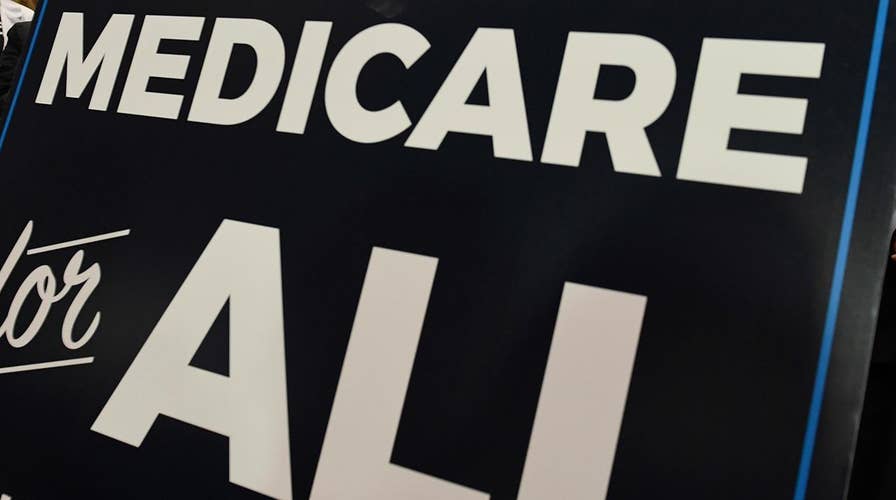What is the true cost of Medicare for all?
Juniper Research Group founder and CEO Chris Jacobs breaks down the cost.
Americans hate to wait. We scout out the shortest grocery line. We choose the fastest delivery option. We chafe at slow-moving internet speeds. And we don’t like to wait for health care when we or our loved ones urgently need it. But if America gets saddled with a radical new health care system called “Medicare-for-All,” a lot of waiting for health care will be in your family’s future.
When Americans got tired of waiting around in clogged emergency rooms for last-minute care, the marketplace responded. Urgent care facilities started sprouting up, offering care for non-life-threatening illnesses and injuries. Hospitals, sensing a threat to their business, now buy billboards advertising current wait times in their ERs.
BERNIE SANDERS PROMISES FREE HEALTH CARE FOR ALL ILLEGAL IMMIGRANTS
But in countries where the marketplace has been supplanted by government-run health care systems like Medicare-for-All, people have no choice but to wait for desperately needed health care on the government’s timetable. Not for minutes or hours, but weeks and months.
According to a comprehensive study by the nonpartisan Fraser Institute, patients in Canada wait an average of nine weeks to see a specialist, and an additional 11 weeks on top of that to receive treatment. Even when every day counts, such as treatment of cancer, patients have to wait a month before getting radiation therapy.
In Canada, where MRIs are “free,” wait times have steadily increased, reaching 364 days in British Columbia. Not surprisingly, some Canadians have taken to paying out-of-pocket for an MRI.
Advanced-stage heart disease can trigger a heart attack or stroke at any time, but in Canada, you’ll wait about two and a half months for coronary bypass surgery unless you are already in an emergency situation. If your life is not at imminent risk, you will wait even longer for care. If you need to be treated by an OB-GYN in Canada, expect to wait 21 weeks. If you’re suffering from acute knee or back pain, you’d better stock up on ibuprofen: you could wait six months to three-quarters of a year for orthopedic surgery.
In Britain, where the government’s role in health care is even more pervasive, wait times are much worse. A 2019 study by the Royal College of Ophthalmologists found that tens of thousands of elderly patients are left struggling with near blindness due to a government cost-cutting drive that relies on them dying before they qualify for cataract surgery. According to another study by the Royal College of Surgeons, nearly a quarter of a million Britons were waiting more than six months—some even longer than nine months—to be scheduled for surgery and other medically necessary treatment.
Why do government-run health care systems—including so-called single-payer schemes like Medicare-for-All—result in long waits for needed care? Because unlike the private sector, government has zero incentive to customize care to individual needs. It achieves efficiencies primarily by doling out one-size-fits-all health care to everyone, regardless of unique circumstances.
Medicare-for-All and its various derivatives all aim to push the private sector out of health care and replace it with more government. This means that government will be deciding what health care Americans can get and when—not doctors, not hospitals, and certainly not patients.
Government is also poor at adjusting to medical innovations, new technologies and changes in epidemiology. For example, Canada has struggled to handle the rise in asthma incidence rates. The Canadian Lung Association found that the average wait time for asthma testing is four weeks, with one in four asthma sufferers waiting longer than three months to be tested. In the U.S., private insurance usually covers most of the cost of expensive MRIs to evaluate medical conditions. But in Canada, where MRIs are “free,” wait times have steadily increased, reaching 364 days in British Columbia. Not surprisingly, some Canadians have taken to paying out-of-pocket for an MRI.
CLICK HERE TO GET THE FOX NEWS APP
Medicare-for-All and its various derivatives all have one ultimate goal: to push the private sector out of health care and replace it with more government. This means that government will be deciding what health care Americans can get and when—not doctors, not hospitals, and certainly not patients. When politicians absurdly promise to make health care “free,” what they actually mean is that government will pick up the tab and bill us later, while deciding what it will pay for and how much to pay. Those decisions obviously and inevitably will impact choice, quality and availability.
This week, on June 26-27, twenty Democratic presidential contenders will face off against one another on the debate stage. Nearly all of them publicly support Medicare-for-All or some variation. Each one should be asked: why should Americans be forced to wait longer (and ultimately pay more) for lower-quality, government-controlled health care?





















